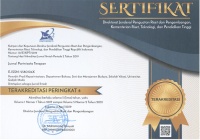Efektivitas Penyampaian Konten Edukasi Agrowisata terhadap Pemahaman Wisatawan di Merapi Farma Herbal Farm Sleman
Nuryuda Irdana(1*), Rina Widiastuti(2), Wiku Purwono(3)
(1) Universitas Gadjah Mada
(2) Universitas Gadjah Mada
(3) Universitas Gadjah Mada
(*) Corresponding Author
Abstract
During the COVID-19 pandemic, herbal agro-tourism became very popular in Indonesia. Agrotourism is closely related to edu-tourism. To build an edu-tourism business, business actors
must apply the concept of creativity so that tourists can gain more useful and educative
knowledge. One of the herbal agro-tourism locations in Sleman is Merapi Farma Herbal Farm.
Even though educational content, facilities, and completeness of resources in the
implementation of agro-tourism packages are already available and well managed, managers
still must know whether the implementation of the tour packages run at Merapi Farma Herbal
Farm has been effective in delivering educational content to the tourist.
This research aimed to determine the types of educational content contained in Merapi Farma
Herbal Farm Sleman, and to determine the effectiveness of delivering agro-tourism educational
content at Merapi Farma Herbal Farm Sleman to tourists' understanding. The research methods
in this study are descriptive method and survey method, and direct observation, interviews
with sources, literature studies, and documentation were conducted to find out the types of
educational content provided by Merapi Farma Herbal Farm. Meanwhile, to determine the
effectiveness of delivering agro-tourism educational content, this research conducted a
hypothesis test to tourists/visitors at Merapi Farma Herbal Farm Sleman as the research
sample. The tool used to collect data is questionnaires. The analytical tool used to test the
hypothesis is the Wilcoxon Test. The results showed that the types of educational content
contained at Merapi Farma Herbal Farm Sleman were education about types of herbal plants,
how to cultivate herbal plants, the benefits of herbal plants, the history of herbal medicine in
Indonesia, and how to mix herbs traditionally. The results of the analysis used the Wilcoxon
Test also show that the delivery of agrotourism educational content at Merapi Farma Herbal
Farm Sleman can provide tourists with an understanding of herbal plants.
Keywords
Full Text:
PDFReferences
Detik. Ekonomi Indonesia Minus, PDB Sektor Pertanian Masih Positif. Diakses pada Maret 01, 2020, dari https://finance.detik.com/berita-ekonomi-bisnis/d-5121769/ekonomi-indonesia-minus-pdb-sektor-pertanian-masih-positif Utama, IGBR., & Junaedi, IWR. (2015). Agrowisata Sebagai Pariwisata Alternatif di Indonesia, Solusi Masif Pengentasan Kemiskinan. Yogyakarta: Deepublish. Jamudigital. Prospek Tanaman Obat Makin Populer Saat COVID-19. Diakses pada Maret 01, 2021, dari https://www.jamudigital.com/berita?id=Prospek_Tanaman_Obat_Makin_Populer_Saat_COVID-19 Ditjen Hortikultura. 2019. Prospek Tanaman Obat Makin Menjanjikan di Tengah Pandemi Covid-19. Diakses pada Maret 01, 2021 dari http://hortikultura.pertanian.go.id/?p=4651 Kurniati, Desna. 2016. Potensi Pengembangan Agrowisata Sebagai Kawasan Eduwisata Lokal di Agrowisata Cilangkap Jakarta Timur. Skripsi, UIN Syarif Hidayatullah. Phinemo. Eduwisata dan Prospeknya Yang Akan Terus Diminati. Diakses pada Juli 27, 2021, dari https://phinemo.com/eduwisata-dan-prospeknya-yang-akan-terus-diminati/ Bereempat. Bisnis Eduwisata Kian Booming. Diakses pada Juli 27, 2021, dari https://berempat.com/bisnis/umkm/12168/bisnis-eduwisata-kian-booming/ Gay, L.R. dan Diehl, P.L. (1992), Research Methods for Business and Management, New York: MacMillan Publishing Company. Sarwono, Jonathan. (2006), Metode Penelitian Kuantitatif dan Kualitatif. Yogyakarta: Graha Ilmu Zaiontz, Charles. (2021, Juli 27). Wilcoxon Signed-Ranks Test. Diakses dari https://www.real-statistics.com/non-parametric-tests/wilcoxon-signed-ranks-test/. Siregar, Syofian. (2013), Metode Penelitian Kuantitatif. Jakarta: PT Fajar Interpratama Mandiri. Fauziah, Hanin Niswatul., dkk. (2016). Agroedutourism Model to Improve Environmental Awareness of Students in Some Elementary School in Malang Raya, East Java. Journal of Indonesian Tourism and Development Studies, 4 (1), 25-30. Adisa, Rashid Solagberu. (2013). Agro-Tourism in North-Central Nigeria: Perceptions, Performance, Problems, and Prospects. Journal of Travel and Tourism Research (Online); Kusadasi-Avdin, 3 (Iss. ½), 54-70. Nisa, Ayu Raisa Khairun., dkk. (2014). Agroedutourism and Ecopreneurship Activities on the Organic Farming Practice in Lawang, Malang Regency, East Java, Indonesia. Journal of Indonesian Tourism and Development Studies, 2 (3), 103-113. Chen, Tang-Ping., dkk. (2021). Article Impacts of Educational Agritourism on Students’ Future Career Intentions: Evidence from Agricultural Exchange Programs. Sustainability. doi:10.3390/su12229507 Budiasa, I Wayan. (2001). Konsep Dan Potensi Pengembangan Agrowisata Di Bali. dwijenAGRO, 2 (1).
Article Metrics
Refbacks
- There are currently no refbacks.
Copyright (c) 2021 Nuryuda Irdana, Rina Widiastuti, Wiku Purwono

This work is licensed under a Creative Commons Attribution-ShareAlike 4.0 International License.













